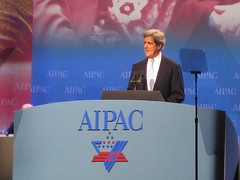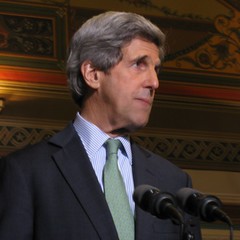Tuesday
May052009
Biden and Kerry: Israel and America Inextricably Linked
Jonathan Bronstein, Talk Radio News Service
In the wake of backlash over President Obama's decision to have diplomatic talks with Iran, high level Democrats are assuring the public that the U.S. commitment to Israel is as strong as ever.
But, "One enduring essential principle that will not change--United States support for Israel,” said Vice President Joe Biden to a standing ovation of more than 6,000 people at the American Israeli Public Affairs Committee's annual convention.
“The path we have been on in recent years has not produced peace and security for Israel and Palestinians, nor will they produce these results,” Biden said. “Because peace has not occurred, does not mean that it cannot occur."
U.S. Sen. John Kerry (D-Mass.), who also spoke at the event, supports the Obama Administration’s policy with Israel. “You can count on Vice President Biden and President Obama in the future,” he said.
Kerry tried to calm fears about Obama’s decision to engage in open discussions with Iran because he believed that the previous administration’s strategy with the Middle Eastern country failed, and that a change is warranted. But, if diplomacy fails, hardline sanctions will be sure to follow, Kerry said.
Since December 2008, foreign criticism of Israel reached new levels. Israel decided to retaliate against Hamas by launching a full military incursion into the Gaza Strip. The Israeli Government maintains that the action was an attempt to halt hundreds of rockets that are launched over Israeli borders by militant groups in neighboring countries.
“I heard of (Israeli) children in the second grade who had spent literally everyday of their lives never 15 seconds from danger/ Fifteen seconds... No child should live that way,” said Kerry to the audience.
Kerry is the chairman of the Senate Foreign Relations Committee and pledged to do everything in his power “to ensure that the $30 billion in security assistance that Congress pledged to Israel is delivered in full.”
Kerry and Biden presented a challenge to Israel: that the country needs to work toward a workable, long lasting and sustainable peace.
Biden believes that any peace is a “show-me plan,” that each side must make efforts to demonstrate their dedication for the process to continue.
Biden said that the building of Israeli settlements must be stopped and that Palestinians must be given freedom of movement so the young people see hope, and do not join Hamas.
But peace must be sought from Paestinians and Israelis. “You cannot make peace out of one side of their mouth and preach hate out of another,” said Kerry, adding that Palestinian geography books should be realistic by including Israel on the map.
In the wake of backlash over President Obama's decision to have diplomatic talks with Iran, high level Democrats are assuring the public that the U.S. commitment to Israel is as strong as ever.
But, "One enduring essential principle that will not change--United States support for Israel,” said Vice President Joe Biden to a standing ovation of more than 6,000 people at the American Israeli Public Affairs Committee's annual convention.
“The path we have been on in recent years has not produced peace and security for Israel and Palestinians, nor will they produce these results,” Biden said. “Because peace has not occurred, does not mean that it cannot occur."
U.S. Sen. John Kerry (D-Mass.), who also spoke at the event, supports the Obama Administration’s policy with Israel. “You can count on Vice President Biden and President Obama in the future,” he said.
Kerry tried to calm fears about Obama’s decision to engage in open discussions with Iran because he believed that the previous administration’s strategy with the Middle Eastern country failed, and that a change is warranted. But, if diplomacy fails, hardline sanctions will be sure to follow, Kerry said.
Since December 2008, foreign criticism of Israel reached new levels. Israel decided to retaliate against Hamas by launching a full military incursion into the Gaza Strip. The Israeli Government maintains that the action was an attempt to halt hundreds of rockets that are launched over Israeli borders by militant groups in neighboring countries.
“I heard of (Israeli) children in the second grade who had spent literally everyday of their lives never 15 seconds from danger/ Fifteen seconds... No child should live that way,” said Kerry to the audience.
Kerry is the chairman of the Senate Foreign Relations Committee and pledged to do everything in his power “to ensure that the $30 billion in security assistance that Congress pledged to Israel is delivered in full.”
Kerry and Biden presented a challenge to Israel: that the country needs to work toward a workable, long lasting and sustainable peace.
Biden believes that any peace is a “show-me plan,” that each side must make efforts to demonstrate their dedication for the process to continue.
Biden said that the building of Israeli settlements must be stopped and that Palestinians must be given freedom of movement so the young people see hope, and do not join Hamas.
But peace must be sought from Paestinians and Israelis. “You cannot make peace out of one side of their mouth and preach hate out of another,” said Kerry, adding that Palestinian geography books should be realistic by including Israel on the map.




 Tuesday, May 5, 2009 at 7:55PM
Tuesday, May 5, 2009 at 7:55PM

Is the U.S. Staying or Going in Afghanistan and Pakistan?
Chairman of the Joint Chiefs of Staff Admiral Michael Mullen argued for patience when it comes to the United States’ relationship with Afghanistan and Pakistan at the Senate Foreign Relations Committee hearing Thursday. Mullen said he plans to set benchmarks for progress while in the two countries.
“I think we know what needs to be done. I think there are some significant challenges in the how to do this. You’ve got to have the security umbrella but the key is education long term. The key is village by village. The key is putting institutions which are not corrupt, developing capacity at every level...which provide for their people,” said Mullen.
In his opening statement Committee Chairman Senator John Kerry (D-MA) said the Obama administration has recognized the tough road ahead and set a goal of not allowing Afghanistan to become a “safe haven for al-Qaeda and other terrorist groups that seek to attack us” again.
Another talking point of the Committee hearing was the United States’ presence in Pakistan. Kerry and Senator Dick Lugar (R-Ind.) have set forth the Kerry-Lugar bill which would fix a Pakistan policy that they believe has “largely failed,” according to Kerry’s opening statement. The bill would triple non-military aid, authorizing it for five to ten years and change the fundamentals of the United States’ relationship with Pakistan. President Obama has called on Congress to pass this Kerry-Lugar bill as part of his overall strategy, said Kerry.
In the conclusion of Mullen’s written statement he said believes the State Department should be funded as the lead agent of U.S. diplomacy and development and that would still require the “backing of a robust military and strong economy.” He said the nation’s military activities should not lead the nation’s foreign policy but instead support it.
Mullen said, “As we win the wars we are fighting and restore the health of our Armed Forces, the military’s approach will increasingly support our diplomatic counterparts through the persistent engagement required to build networks of capable partners. By operating hand-in-hand with partners and integrated with the interagency and non-governmental organizations, we will more successfully protect the citizens of this Nation.”